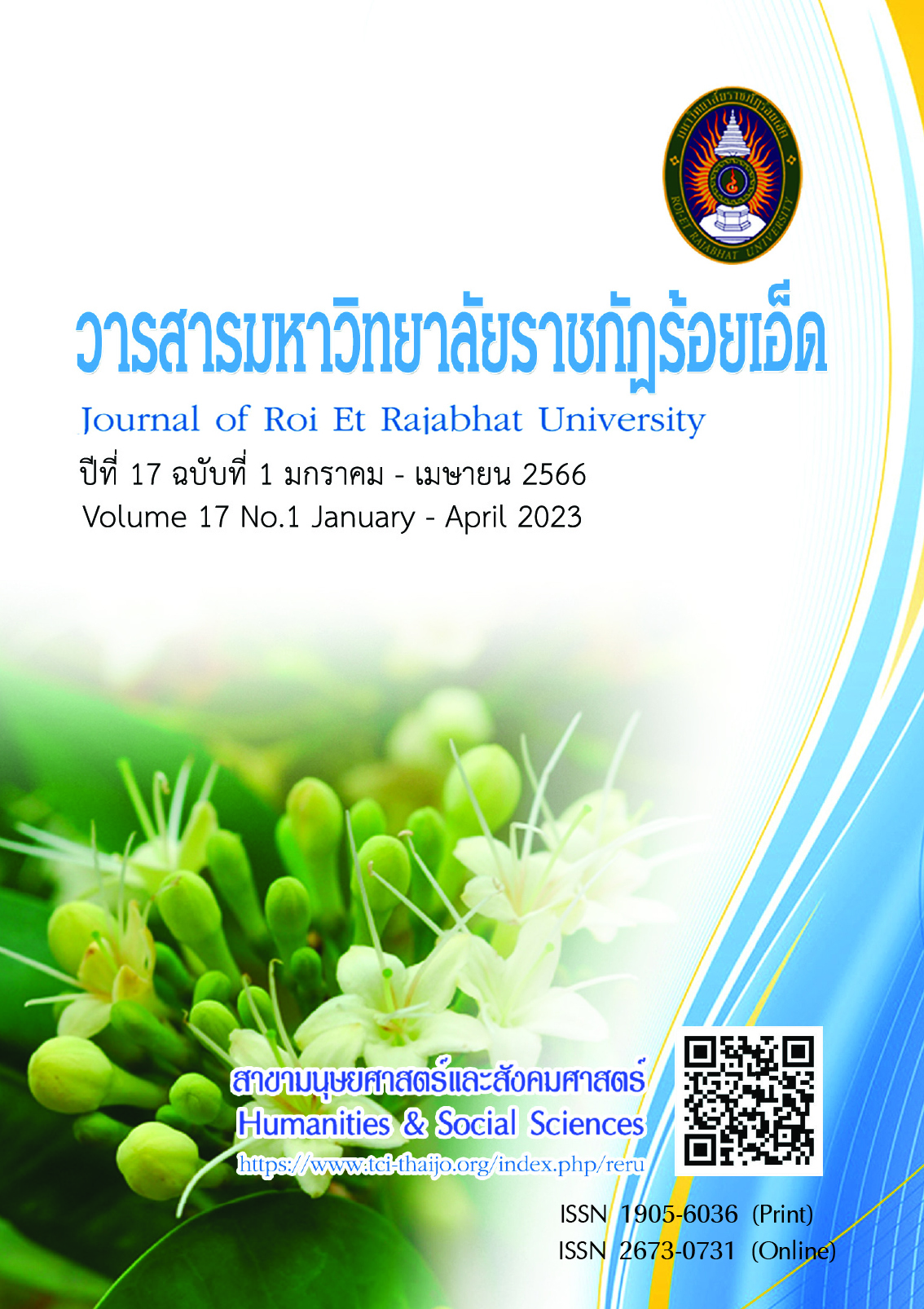Developing a Learning Model to Enhance Innovation Skills in Additional Physics Courses of Students in Grade 11
Keywords:
Learning management model, Innovation skills, PhysicsAbstract
The objectives of this research were: 1) to study the basic information and the need for the development of a learning management model to promote innovative skills of Grade 11 students; 2) to develop a learning management model to promote innovative skills of Grade 11 students; and 3) to investigate the results of using the learning management model to promote innovative skills of Grade 11 students. The samples were 29 students in Grade 11, room 1, which was obtained by purposive sampling. The tools used to collect information include a learning management plan, behavioral observation form, student innovation skills assessment form, and learning achievement test. Data were analyzed by using percentage, mean, standard deviation, and t-test
The results of the research were as follows: 1) The innovation skills are important skills that should be promoted to grade 11 students, indicating that the students' innovation skills were at a low level. Teaching conditions based on innovative skills and learning achievement of Grade 11 students were also used at a very low level; 2) The learning management model to promote innovative skills and the student's learning achievement consisted of 6 components, those were 1) Principles, Concepts, and Basic Theories 2) Objectives 3) Learning Steps 4) Social Systems 5) Response Principles and 6) Support Systems. The synthesized instructional process with 5 steps consisted of 1) the goals identification step 2) the Brainstorming step
3) the Fabrication stage 4) the Trial stage and 5) the Conclusion; and 3) The results of using the learning management model to promote innovative skills and student achievement were post-study innovation skills were significantly higher than the average score of pre-study at the .05 level, and post-learning achievement was significantly higher than the average score of pre-learning at the .05 level.
References
กองบริหารงานวิจัยและประกันคุณภาพการศึกษา. (2560). Thailand 4.0 โมเดลขับเคลื่อนประเทศไทยสู่ความมั่นคง มั่งคั่ง และยั่งยืน. กรุงเทพฯ: กระทรวงศึกษาธิการ.
ทรงศักดิ์ภูสีอ่อน. (2561). การวิจัยและพัฒนาทางการศึกษา. มหาสารคาม: ตักสิลาการพิมพ์.
ธงชัย โรจน์กังสดาล. (2559). Innovative Thinking Skills: ค้นหาทักษะในการเป็นผู้สร้างสรรค์ที่เหมาะกับตัวคุณ. กรุงเทพฯ: พีเพิล แวลู โซลูชั่น โพรไวเดอร์.
ธูปทอง กว้างสวาสดิ์. (2552). การสอนทักษะการคิด. มหาสารคาม: ภาควิชาหลักสูตรและการสอน มหาวิทยาลัยมหาสารคาม.
รัตนะ บัวสนธ์. (2556). การวิจัยและพัฒนานวัตกรรมการศึกษา. พิษณุโลก: บั๊วกราฟฟิค.
โรงเรียนรมย์บุรีพิทยาคม รัชมังคลาภิเษก. (2562). รายงานผลการปฏิบัติงานประจำปีการศึกษา 2562. บุรีรัมย์: สำนักงานเขตพื้นที่การศึกษามัธยมศึกษาบุรีรัมย์.
วิเชียร ไชยบัง. (2561). วุฒิภาวะของความเป็นครู (พิมพ์ครั้งที่ 9). บุรีรัมย์: เรียนนอกกะลา.
สกุลรัตน์ แก้วสมบัติ. (2563). การพัฒนาชุดกิจกรรมการแปรรูปอาหารโดยการเรียนรู้แบบโครงงานร่วมกับการเรียนรู้แบบร่วมมือ ที่ส่งผลต่อทักษะปฏิบัติ ความคิดสร้างสรรค์และผลสัมฤทธิ์ทางการเรียน ของนักเรียนชั้นมัธยมศึกษาปีที่ 1.
วารสารมหาวิทยาลัยราชภัฏร้อยเอ็ด, 14(2), 114-125.
สำนักงานคณะกรรมการพัฒนาการเศรษฐกิจและสังคมแห่งชาติ (2558). แผนพัฒนาการเศรษฐกิจและสังคมแห่งชาติ. กรุงเทพฯ: พริกหวานกราฟฟิค.
สำนักงานเลขาธิการสภาการศึกษา. (2560). แผนการศึกษาชาติ พ.ศ. 2560-2579. กรุงเทพฯ: พริกหวานกราฟฟิค .
Australian National Training Authority (ANTA). (2001). Innovation: Ideas That Work for Trainers of Innovation at Work Skills. Brisbane: Australian National Training Authority.
Barkley, E. F., Cross, K. P., & Major, C. H. (2014). Collaborative Learning Techniques: a handbook for college faculty (3rd ed.). New York: John Wiley & Sons: 83-90.
Bellanca, J. A. (2010). 21st century skills: Rethinking how students learn. United States: Solution Tree Press.
Bender, W. N. (2012). Project-based learning: Differentiating instruction for the 21st century. United States: Corwin.
Desai, K. C. (2018). Cultivate the Habit of Innovative Thinking: To Strengthen Your Professional Career and Enhance Your Personality. India: Educreation Publishing. 243–253.
Drapeau, P. (2014). Sparking student creativity: Practical ways to promote innovative thinking and problem solving. Virginia USA: ASCD.
Edwards, A. (2012). New technology and education. London: A&C Black.
Horth, D. and Buchner, D. (2009). Innovation Leadership: How to use innovation to lead effectively, work collaboratively and drive results. London: Center for Creative Leadership.
Joyce, B., Weil, M. and Calhoun, E. (2014). Models of Teaching (9th ed.). Boston: Pearson Education.
Kay, K. (2010). 21st Century Skills: Why the Matter, What They are, and How We Get There. In Bellanca, J. & Brandt, R. (Eds.), 21st Century Skills: Rethinking How Students Learn. Bloomington, In: Solution Tree Press.
Knirk, F. G. and Gustafson, K. L. (1986). Instructional Technology: A Systematic Approach to Education. Florida: Holt, Rinehart and Winston.
Kolb, D. A. (2015). Experiential learning: Experience as the source of learning and development (2nd ed.). United States: Pearson Education.
Lee, C. and Benza, R. (2015).Teaching Innovation Skills: Application of Design Thinking in a Graduate Marketing Course. Business Education Innovation Journal, 7(1), 43-50.
Ma, Y. (2014). Innovative Thinking Plays Important Role in Graphic Design. International Conference on Education, Management and Computing Technology (ICEMCT 2014). June 14-15, 2014. Qingdao Binhai University, Chaina.
Weiss, D. S. and Legrand, C. (2011). Innovative Intelligence: The art and practice of leading sustainable innovation in your organization. New York: John Wiley & Sons.
Wheeler, J. (1998). The Power of Innovative Thinking: Let New Ideas Lead You to Success. Career PressInc.
Zhu, C., Wang, D., Cai, Y. and Engels, N. (2013). What core competencies are related to teachers' innovative teaching?. Asia-Pacific Journal of Teacher Education, 41(1), 9-27
Downloads
Published
How to Cite
Issue
Section
License
Copyright (c) 2023 Roi Et Rajabhat University

This work is licensed under a Creative Commons Attribution-NonCommercial-NoDerivatives 4.0 International License.
บทความที่ได้รับการตีพิมพ์เป็นลิขสิทธิ์ของวารสารมหาวิทยาลัยราชภัฎร้อยเอ็ด
ข้อความที่ปรากฏในบทความแต่ละเรื่องในวารสารวิชาการเล่มนี้เป็นความคิดเห็นส่วนตัวของผู้เขียนแต่ละท่านไม่เกี่ยวข้องกับมหาวิทยาลัยราชภัฎร้อยเอ็ด และคณาจารย์ท่านอื่นๆในมหาวิทยาลัยฯ แต่อย่างใด ความรับผิดชอบองค์ประกอบทั้งหมดของบทความแต่ละเรื่องเป็นของผู้เขียนแต่ละท่าน หากมีความผิดพลาดใดๆ ผู้เขียนแต่ละท่านจะรับผิดชอบบทความของตนเองแต่ผู้เดียว





